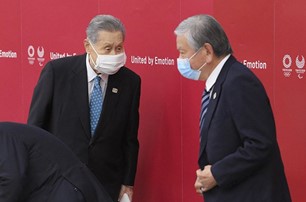EDITORIAL: Mori symbolizes a mindset that Japan must finally cast aside
(The Asahi Shimbun, February 13)

Yoshiro Mori resigned as president of the Tokyo Olympics organizing committee on Feb. 12 following an uproar over his sexist remarks.
Mori’s resignation was inevitable and came way too late in view of the damage he inflicted on the dignity of women and the image of the Olympics. He bore a grave responsibility
In a surprising and outrageous move, the day before he announced his resignation, Mori met with Saburo Kawabuchi, executive adviser for the Japan Football Association, who serves as a councilor of the organizing committee, and asked Kawabuchi to succeed him as committee president.
It strains credulity that having been forced to step down after leaving such a big stain on the reputation of the Olympics, Mori tried to name his successor.
Kawabuchi not only accepted Mori’s offer but also asked him to serve as adviser to the committee. The way Mori and Kawabuchi think and behave is surprisingly divorced from the common sense and perceptions of ordinary citizens.
For it to make a fresh start, the committee faced the crucial task of clarifying the issues inherent in Mori’s remarks so it could discuss the qualities and abilities required to overcome those problems and select a qualified individual according to its organizational rules.
But the their “disconnect” to accepted ways of thinking only deepened the public’s distrust.
The bizarre backdoor deal was immediately questioned at the Diet. It also generated critical coverage in newspapers, TV programs and the online community, forcing Kawabuchi to declare the following day he would not accede to Mori's request.
The unseemly spectacle of outrageous imprudence has done little to help bolster public support for the Olympics at a time when uncertainty is growing about the outlook of the event due to the novel coronavirus pandemic.
Mori and Kawabuchi are not the only ones who should be criticized, however.
After Mori announced his resignation, the organizing committee’s councilors and its executive board held a joint meeting. The members reportedly discussed how to select Mori’s successor and other issues.
If the councilors and the executive board, which have the power to dismiss the president and other executives, had properly performed their governance roles, the situation would not have remained chaotic for so long.
In his misogynist remarks, Mori praised women who “know how to behave” and expressed his support for short meetings without much debate like those at the organizing committee.
The councilors and executive board members should realize that this dire situation was a consequence of such a mindset.
The matter also underscored the reality that Japan failed miserably to make significant progress toward gender equality.
The government’s plan to promote the empowerment of women adopted at the end of last year shows many signs indicating its lukewarm commitment to helping women play greater roles in society.
Prime Minister Yoshihide Suga and other senior administration officials failed to demonstrate affirmative actions in response to Mori’s remarks. They should recognize the huge gaps between their values and those in Japanese society in general and international norms.
Suga said Mori’s remarks were detrimental to Japan’s national interest. If he meant it, he has his work cut out for him. Mori’s resignation alone will do nothing to solve the problems his gaffe has highlighted.



